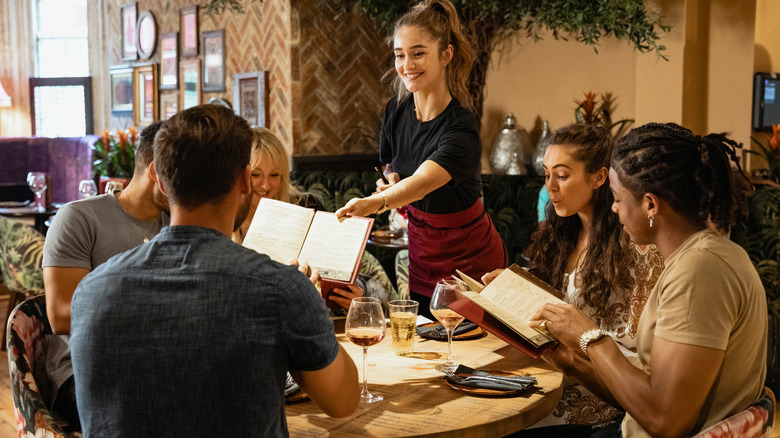Where Does The Word Restaurant Really Come From?
Restaurants are deeply personal and can mean a multitude of things to different people. They may exist only as a "fueling station," a place to eat, recharge, and move on. They may be powerful and meditative and restorative, a curative place in which the deep gustatory pleasure is moving. They may be strictly a social setting, an opportunity to tender a romantic ember, or a long-waited reunion. And that's only the patrons.
The entire ethos of a restaurant means something entirely different to the "back of house" — the cooks, the dishwashers, and the other workers. Similarly, while some may view that establishment as strictly a job, others may find a restaurant to be the outlet for their creativity.
It's also important to note the natural demarcations of what defines a restaurant — is it only a fine dining establishment? Is it a McDonalds? Is it a café? Could it be a bar? How did it originate, and where did the name come from?
Initially, the whole point of a restaurant was to fill empty stomachs — and perhaps to imbibe a bit. Merriam-Webster notes that one of the very first restaurants to be reported or written about is said to have opened in Paris in the mid-1700s by a man named Boulanger, and it primarily sold bouillons restaurants — French for "restorative broths."
What are the origins of restaurants?
As the name implies, "restaurant" actually comes from "restaurare," which means "to renew" — clearly a much more holistic, modern-day interpretation of the concept of restaurants. As National Geographic notes, people often lived without kitchens or any means of cooking "at home," which in turn made having places to go to "eat out" absolutely paramount. Medium states that the original restaurant may have originated in the 6th century BCE, in which a streamlined menu offered only one dish. By the 12th century, "cook houses" were established, but they often had no seats or any sort of communal gathering; food was purchased and picked up, while convivial gatherings were saved for "inns, taverns, hostelries, and monasteries." History notes that some of the originally "recognizable" establishments that were clearly early restaurants began to appear around 1100 CE throughout China, when crowded urban cities began to boast millions of denizens. Many restaurants were also being created in Japan throughout the 1500s and 1600s, including restaurants specializing in kaiseki dining, in which the menu told "the story of a particular place and season."
The modern restaurant began to appear in France in the late 1700s. They were more rooted in health and restorative medicine than gastronomic pleasure. It became clear that simple broth wasn't substantial enough for most patrons. Some additional food was added, such as chicken or bread (via Medium).
Restaurants have come a long way. We do a disservice to our ancestors by not acknowledging the original eateries, the first restaurants, and the places that fed and renewed hungry patrons for hundreds of years.

